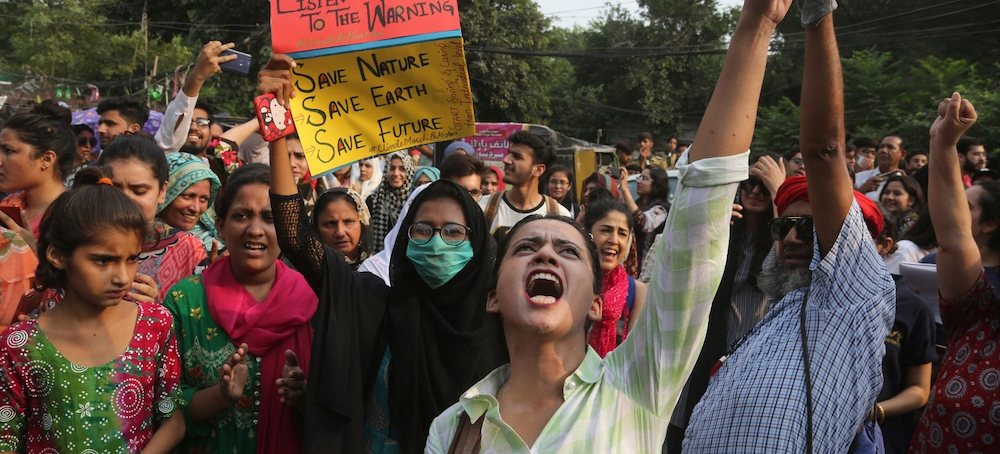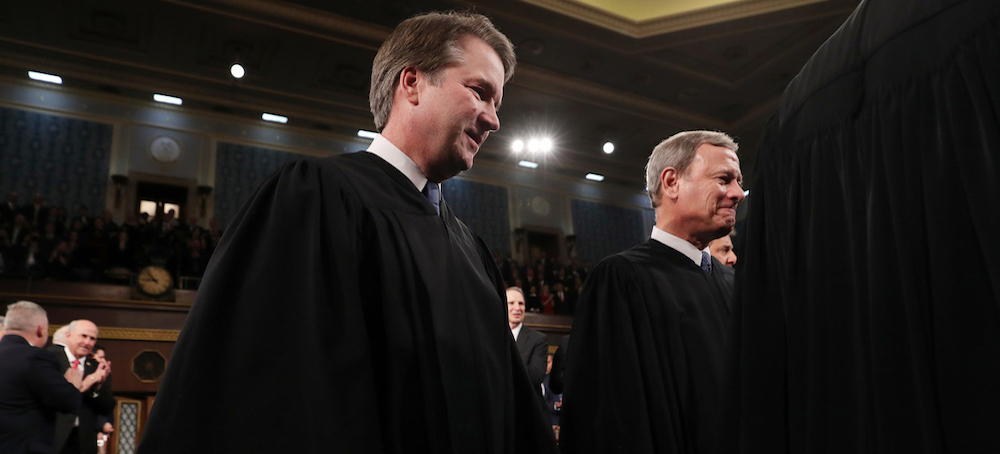Live on the homepage now!
Reader Supported News
 Members of the United States Secret Service stand guard as Marine One carrying President Donald Trump lifts off from the South Lawn of the White House on Sept. 12, 2019, in Washington. (photo: Jabin Botsford/WP)
Members of the United States Secret Service stand guard as Marine One carrying President Donald Trump lifts off from the South Lawn of the White House on Sept. 12, 2019, in Washington. (photo: Jabin Botsford/WP)
A Secret Service spokesperson told CNN that the agency had contact with the extremist group, whose founder and other members are currently on trial, as part of its standard intelligence-gathering duties.
The official told CNN that members of the extremist group had occasionally reached out to the agency regarding items that they were allowed to bring to rallies.
“We are aware that individuals from the Oath Keepers have contacted us in the past to make inquiries,” Secret Service spokesman Anthony Guglielmi told the news organisation.
The official stated that it was commonplace for agents to also reach out and contact the group when they found out they would be attending events and demonstrations.
The Secret Service’s relationship with the group has been brought up in the trial of the group’s leader Stewart Rhodes.
A court heard that Mr Rhodes had claimed he was in contact with a Secret Service agent in the months leading up to the January 6 attack on the US Capitol by Donald Trump’s supporters.
John Zimmerman, a former member of the group, testified in the trial of Mr Rhodes and four other Oath Keepers who are charged with seditious conspiracy in what prosecutors have described as a plot to use force to stop the transfer of presidential power from Mr Trump to Democrat Joe Biden, who won the election.
Mr Zimmerman told a jury that he witnessed a phone call between Mr Rhodes and a purported Secret Service agent in September 20202 at a Trump rally in Fayetteville, North Carolina.
Mr Zimmerman could not say for sure that Mr Rhodes was speaking to someone with the Secret Service — only that Rhodes told him he was — and it was not clear what they were discussing.
Mr Zimmerman said Mr Rhodes wanted to find out the “parameters” that the Oath Keepers could operate under during the election-year rally.
Rhodes, from Granbury Texas, and four associates are being tried on a Civil War-era charge punishable by a maximum of 20 years in prison.
The others are Thomas Caldwell of Berryville, Virginia; Kenneth Harrelson of Titusville, Florida; Jessica Watkins of Woodstock, Ohio; and Kelly Meggs of Dunnellon, Florida.
Hours after Mr Guglielmi’s comments to CNN, the Secret Service was thrust into the spotlight at the latest January 6 committee hearing.
Emails released at the hearing showed that the Secret Service was aware of plans for violence on 6 January 2021.
Oakland Cops Hope to Arm Robots With Lethal Shotguns
Sam Biddle, The Intercept
Biddle writes: "In a series of little noted Zoom meetings this fall, the city of Oakland, California, grappled with a question whose consequences could shape the future of American policing: Should cops be able to kill people with shotgun-armed robots?"
READ MORE "New research reveals that these anxieties are not just Western concerns - they're common among young people on nearly every continent." (photo: K.M. Chaudary/AP)
"New research reveals that these anxieties are not just Western concerns - they're common among young people on nearly every continent." (photo: K.M. Chaudary/AP)
The broadest look yet shows it's not just a Western worry.
New research reveals that these anxieties are not just Western concerns — they’re common among young people on nearly every continent — but that the ability to do something about them depends on where you live. “The question is whether you have the opportunity or not to engage in those behaviors,” said Charles Ogunbode, a psychologist at the University of Nottingham in the United Kingdom.
The study, recently published in the Journal of Environmental Psychology, takes the broadest look yet at climate anxiety around the globe. Ogunbode and researchers all over the world surveyed more than 10,000 university students in 32 countries, asking how climate change made them feel. They found that it was hurting people’s mental health virtually everywhere, from Brazil to Uganda, Portugal to the Philippines.
Almost half of the young people surveyed said they were “very” or “extremely” worried about climate change. Nearly a quarter felt “terrified,” and even more felt either “very” or “extremely” anxious. Previous research has suggested that climate anxiety is widespread: Last year, a survey in 11 countries around the world found that 45 percent of teens and young adults said that climate anxiety was affecting their daily lives and ability to function.
“Climate anxiety” has become a catch-all for how worries about our overheating planet affect people’s mental health. Experts say that feeling grief, fear, and anxiety is a logical response to the catastrophic situation. But some researchers have argued that the phrase “climate anxiety” is ambiguous — a buzzword, not a clinical diagnosis — and that it tends to resonate more with white and wealthy people than those experiencing the most severe effects of climate disasters.
While the study didn’t look at how people respond to the phrase itself, the results show that it’s not just those in wealthier countries like the United States who are wrestling with tough emotions as a result of climate change. Ogunbode thinks developing countries should play a bigger part in the conversation, since the link between emotions and mental health is “just as strong” as it is in rich countries.
“We very rarely find anyone talking about how people in Ghana or the Philippines feel about climate change,” he said. “It’s almost like, ‘Look, as long as we can provide the basic stuff — people can eat, they have a place to sleep, they have water — that’s it. That’s fine.’”
The new study found that across the board, people’s concerns about climate change motivated them to want to take action. But anxiety played a role in motivating people to adopt environmentally-friendly behaviors, especially in richer, more individualistic countries — places where people are more likely to fly carbon-guzzling planes or drive large cars for small trips.
The most apparent barriers to direct action were political. It’s not as easy to protest climate change in a country that doesn’t protect the right to free speech or demonstrations. People worrying about the climate were more likely to engage in demonstrations in just under half of the countries studied, most of them in Europe. The connection was the strongest in Finland, one of the world’s most democratic countries, and the weakest in China, among the world’s least.
In three-quarters of the countries studied, climate anxiety appears to lead to eco-friendly behaviors — avoiding food waste, for instance, or walking and biking instead of driving. The exceptions were Egypt, Iran, Japan, Malaysia, Oman, Pakistan, and Tanzania.
In some places, people don’t have access to much information about what kind of actions are effective, Ogunbode said. Looking at open-ended responses to the survey, people in countries like the Philippines and Malaysia indicated that the survey questions themselves — about saving energy and reducing waste — had provided them with new information, Ogunbode said. “I got the sense that a lot of people only realized when they were reading through the questions, ‘Oh, maybe there’s something I can be doing.’”
Follow us on facebook and twitter!
PO Box 2043 / Citrus Heights, CA 95611



No comments:
Post a Comment
Note: Only a member of this blog may post a comment.